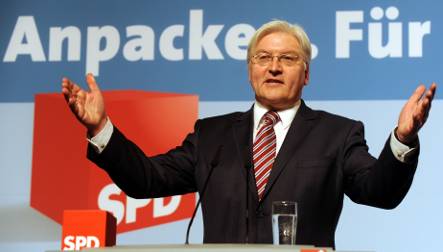The private session featured current Foreign Minister and chancellor-candidate Frank-Walter Steinmeier and SPD party head Franz Müntefering trying to the rally 400-odd parliamentary candidates as opinion polls show the party headed for an epic thrashing on September 27.
The latest calamity to hit the party is a scandal involving SPD Health Minister Ulla Schmidt’s official vehicle, a €90,000 armoured Mercedes S-Class, stolen while she was vacationing in Spain.
While Schmidt flew to Spain at her own expense, she planned to attend a few minor official events and requested that her driver make the 2,387-kilometre journey from Berlin in the official car to her vacation flat near the Costa Brava.
A thief stole the car keys from the driver’s unlocked apartment and made off with the Mercedes last weekend. Rival politicians and headline writers have had a field day with the news, saying the incident underscores how out of touch the SPD has become after 11 years in power.
Müntefering tried to play down the limo incident at Tuesday’s event and defended Schmidt.
“Ulla Schmidt has already had to live with prejudices many times,” Müntefering said, noting that she had been attacked by opponents just in the past weeks over changes to how doctors are paid. “This is an experienced and mature woman who will hold her own through this, I’m very certain,” he said.
The most recent opinion polls show the Social Democrats drawing just 24 percent of the vote versus 36 percent for their right-of-centre Christian Democratic Union rivals.
A repeat of the current “Grand Coalition” between the CDU and SPD seems increasingly unlikely as the pro-business Free Democratic Party (FDP) continues to gain strength, now drawing 14 percent of support in polls. Both the FDP and CDU have said they would prefer to rule together in a coalition government.
Chancellor-candidate Steinmeier will begin a “summer trip” through Germany to win over voters. On Thursday, he will announce his “election campaign team” in an effort to signal those likely to be important players in a future SPD government.
Steinmeier’s mentor, former chancellor Gerhard Schröder also attended the Hannover event to speak about campaign strategies.




 Please whitelist us to continue reading.
Please whitelist us to continue reading.
Member comments